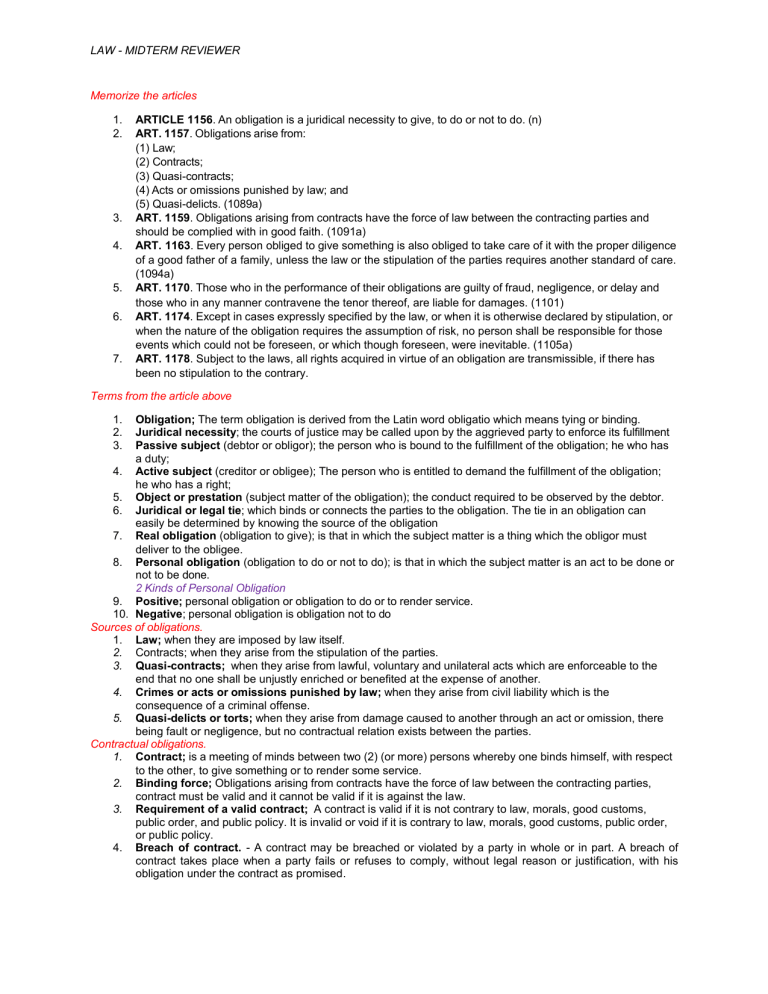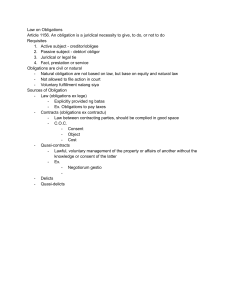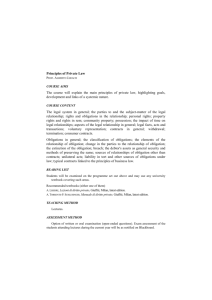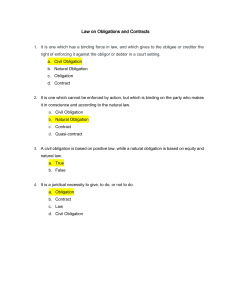
LAW - MIDTERM REVIEWER Memorize the articles 1. 2. 3. 4. 5. 6. 7. ARTICLE 1156. An obligation is a juridical necessity to give, to do or not to do. (n) ART. 1157. Obligations arise from: (1) Law; (2) Contracts; (3) Quasi-contracts; (4) Acts or omissions punished by law; and (5) Quasi-delicts. (1089a) ART. 1159. Obligations arising from contracts have the force of law between the contracting parties and should be complied with in good faith. (1091a) ART. 1163. Every person obliged to give something is also obliged to take care of it with the proper diligence of a good father of a family, unless the law or the stipulation of the parties requires another standard of care. (1094a) ART. 1170. Those who in the performance of their obligations are guilty of fraud, negligence, or delay and those who in any manner contravene the tenor thereof, are liable for damages. (1101) ART. 1174. Except in cases expressly specified by the law, or when it is otherwise declared by stipulation, or when the nature of the obligation requires the assumption of risk, no person shall be responsible for those events which could not be foreseen, or which though foreseen, were inevitable. (1105a) ART. 1178. Subject to the laws, all rights acquired in virtue of an obligation are transmissible, if there has been no stipulation to the contrary. Terms from the article above 1. 2. 3. Obligation; The term obligation is derived from the Latin word obligatio which means tying or binding. Juridical necessity; the courts of justice may be called upon by the aggrieved party to enforce its fulfillment Passive subject (debtor or obligor); the person who is bound to the fulfillment of the obligation; he who has a duty; 4. Active subject (creditor or obligee); The person who is entitled to demand the fulfillment of the obligation; he who has a right; 5. Object or prestation (subject matter of the obligation); the conduct required to be observed by the debtor. 6. Juridical or legal tie; which binds or connects the parties to the obligation. The tie in an obligation can easily be determined by knowing the source of the obligation 7. Real obligation (obligation to give); is that in which the subject matter is a thing which the obligor must deliver to the obligee. 8. Personal obligation (obligation to do or not to do); is that in which the subject matter is an act to be done or not to be done. 2 Kinds of Personal Obligation 9. Positive; personal obligation or obligation to do or to render service. 10. Negative; personal obligation is obligation not to do Sources of obligations. 1. Law; when they are imposed by law itself. 2. Contracts; when they arise from the stipulation of the parties. 3. Quasi-contracts; when they arise from lawful, voluntary and unilateral acts which are enforceable to the end that no one shall be unjustly enriched or benefited at the expense of another. 4. Crimes or acts or omissions punished by law; when they arise from civil liability which is the consequence of a criminal offense. 5. Quasi-delicts or torts; when they arise from damage caused to another through an act or omission, there being fault or negligence, but no contractual relation exists between the parties. Contractual obligations. 1. Contract; is a meeting of minds between two (2) (or more) persons whereby one binds himself, with respect to the other, to give something or to render some service. 2. Binding force; Obligations arising from contracts have the force of law between the contracting parties, contract must be valid and it cannot be valid if it is against the law. 3. Requirement of a valid contract; A contract is valid if it is not contrary to law, morals, good customs, public order, and public policy. It is invalid or void if it is contrary to law, morals, good customs, public order, or public policy. 4. Breach of contract. - A contract may be breached or violated by a party in whole or in part. A breach of contract takes place when a party fails or refuses to comply, without legal reason or justification, with his obligation under the contract as promised. LAW - MIDTERM REVIEWER 5. Compliance in good faith; means compliance or performance in accordance with the stipulations or terms of the contract or agreement. Sincerity and honesty must be observed to prevent one party from taking unfair advantage over the other. Article 1174. 1. Fortuitous event; is any event which cannot be foreseen, or which, though foreseen, is inevitable. Stated otherwise, it is an event which is either impossible to foresee or impossible to avoid. 2. Acts of man; Strictly speaking, fortuitous event is an event independent of the will of the obligor but not of other human wills. 3. Acts of God; They refer to what is called majeure or those events which are totally independent of the will of every human being. Article 1178. 1. Transmissibility of rights; All rights acquired in virtue of an obligation are generally transmissible or assignable. Memorize the terms from the (PDF) 1. Quasi-contract; is that juridical relation resulting from lawful, voluntary and unilateral acts by virtue of which the parties become bound to each other to the end that no one will be unjustly enriched or benefited at the expense of another. (Art. 2142.) Kinds of quasi-contracts. 2. Negotiorum gestio; is the voluntary management of the property or affairs of another without the knowledge or consent of the latter. (Art. 2144.) 3. Solutio indebiti; is the juridical relation which is created when something is received when there is no right to demand it and it was unduly delivered through mistake. (Art. 2154,) It is based on the principle that no one shall enrich himself unjustly at the expense of another. 4. Quasi-delict; is an act or omission by a person (tortfeasor) which causes damage to another in his person, property, or rights giving rise to an obligation to pay for the damage done, there being fault or negligence but there is no pre-existing contractual relation between the parties. (Art. 2176.) 5. Specific or determinate thing; A determinate thing is identified by its individuality.The debtor cannot substitute it with another although the latter is of the same kind and quality 6. Generic or indeterminate thing; A generic thing is identified only by its specie. The debtor can give anything of the same class as long as it is of the same kind. Different kinds of fruits. 1. 2. 3. Natural fruits; are the spontaneous products of the soil, and the young and other products of animals. EXAMPLES: Grass; all trees and plants on lands produced without the intervention of human labor. Industrial fruits; are those produced by lands of any kind through cultivation or labor. EXAMPLES: Sugar cane; vegetables; rice; and all products of lands brought about by reason of human labor. Civil fruits; are those derived by virtue of a juridical relation. EXAMPLES Rents of buildings, price of leases of lands and other property and the amount of perpetual or life annuities or other similar income. Meaning of personal right and real right. 1. 2. 3. Personal right; is the right or power of a person (creditor) to demand from another (debtor), as a definite passive subject, the fulfillment of the latter's obligation to give, to do, or not to do. Real right; is the right or interest of a person over a specific thing (like ownership, possession, mortgage), without a definite passive subject against whom the right may be personally enforced. Personal right and real rights distinguished; In personal right there is a definite active subject and a definite passive subject, while in real right, there is only a definite active subject without any definite passive subject. (see Art. 1156.) Meaning of delay. 1. 2. Ordinary delay; is merely the failure to perform an obligation on time. Legal delay or default or mora; is the failure to perform an obligation on time which failure constitutes a breach of the obligation. Kinds of delay or default. LAW - MIDTERM REVIEWER 1. 2. 3. Mora solvendi; or the delay on the part of the debtor to fulfill his obligation (to give or to do); Mora accipiendi; or the delay on the part of the creditor to accept the performance of the obligation. Compensatio more; or the delay of the obligors in reciprocal obligations (like in sale), ic., the delay of the obligor cancels the delay of the obligee, and vice-versa. The net result is that there is no actionable default on the part of both parties. Pure and Conditional Obligations 1. 2. 3. Meaning of pure obligation; A pure obligation is one which is not subject to any condition and no specific date is mentioned for its fulfillment and is, therefore, immediately demandable. Meaning of conditional obligation; A conditional obligation is one whose consequences are subject in one way or another to the fulfillment of a condition. Meaning of condition; Condition is a future and uncertain event, upon the happening of which, the acquisition or extinguishment of an obligation (or right) subject to it depends. Two principal kinds of condition. 1. 2. Suspensive condition; (condition precedent or condition antecedent) or one the fulfillment of which will give rise to an obligation (or right). In other words, the demandability of the obligation is suspended until the happening of the uncertain event which constitutes the condition. Resolutory condition; (condition subsequent) or one the fulfillment of which will extinguish an obligation (or right) already existing. Article 1191. Kinds of obligation according to the person obliged. 1. 2. 3. 4. Unilateral; when only one party is obliged to comply with a prestation. Bilateral; when both parties are mutually bound to each other. In other words, both parties are debtors and creditors of each other. Bilateral obligations may be reciprocal or non-reciprocal. Reciprocal obligations; are those which arise from the same cause and in which each party is a debtor and creditor of the other, such that the performance of one is designed to be the equivalent and the condition for the performance of the other of his own obligation. Non-reciprocal obligations; are those which do not impose simultaneous and correlative performance on both parties. In other words, the performance of one party is not dependent upon the simultaneous performance by the other of his own obligation. Article 1192 Where both parties are guilty of breach. 1. 2. First infractor known; One party violated his obligation; subsequently, the other also violated his part of the obligation. In this case, the liability of the first infractor should be equitably reduced. First infractor cannot be determined; One party violated his obligation followed by the other, but it cannot be determined which of them was the first infractor. The rule is that the contract shall be deemed extinguished and each shall bear his own damages. Joint and Solidary Obligations 1. 2. 3. 4. Individual obligation; one where there is only one (1) obligor or one (1) obligee; Collective obligation; one where there are two (2) or more debtors and /or two (2) or more creditors. It may be joint or solidary. Joint obligation; one where the whole obligation is to be paid or fulfilled proportionately by the different debtors and / or is to be demanded proportionately by the different creditors. Solidary obligation; or one where each one of the debtors is bound to render, and / or each one of the creditors has a right to demand from any of the debtors, entire compliance with the prestation. Words used to indicate joint liability. 1. 2. Other words used for joint obligations are: mancomunada; mancomunadamente; pro rata; proportionately; "we promise to pay" signed by two (2) or more persons. Words used to indicate solidary liability; jointly and/or severally; solidaria; in solidum; together and /or separately; individually and/or collectively; juntos o separadamente Article 1231 Obligations are extinguished: LAW - MIDTERM REVIEWER 1. 2. 3. 4. 5. 6. By payment or performance; By the loss of the thing due; By the condonation or remission of the debt; By the confusion or merger of the rights of creditor and debtor; By compensation; By novation; (the substitution of a new contract in place of an old one.)





